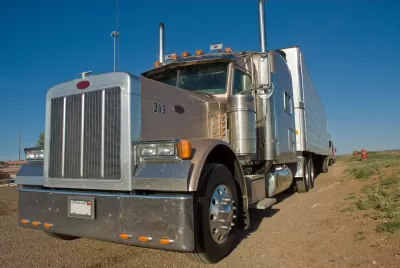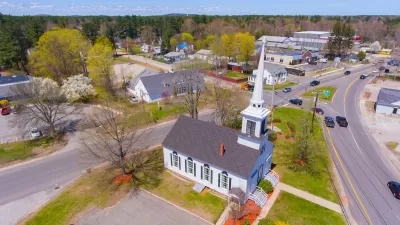A new zoning ordinance banning semi-trucks from a rural unincorporated area of Palm Beach County has prompted long-time semi-driver residents to sue for the right to continue to park their vehicles on their properties.

Two residents of The Acreage, an unincorporated part of Palm Beach County, Florida, have sued the county over its recent decision to ban semi-trucks from the neighborhood. “The lawsuit accuses the county of practicing ‘rural gentrification,’” by “seeking to attract white-collar residents into the region by slowly changing zoning ordinances to push out long-time blue-collar commercial residents” such as the plaintiffs, who park semis on their property, says an article in The Palm Beach Post.
According to the county’s new zoning ordinance, residents with trucks weighing more than 8 tons (16,000 pounds) will have to relocate the vehicles by July 1. According to the Post, the move by county commissioners came in response to complaints by other residents that “the presence of the large trucks was threatening their lifestyles.” Proponents of the ban, including the road system operator and the The Acreage Landowners Association, argue that the road system was never designed to accommodate such heavy vehicles and that allowing them would increase road maintenance costs.
The semi owners who filed the lawsuit claim the requirement to park their trucks offsite will render their businesses unprofitable and effectively lower their property values and render their properties unusable for their intended purposes (as parking for their businesses’ vehicles).
FULL STORY: 'Rural gentrification': Acreage truckers sue Palm Beach County to stop semi-truck ban

Maui's Vacation Rental Debate Turns Ugly
Verbal attacks, misinformation campaigns and fistfights plague a high-stakes debate to convert thousands of vacation rentals into long-term housing.

Planetizen Federal Action Tracker
A weekly monitor of how Trump’s orders and actions are impacting planners and planning in America.

In Urban Planning, AI Prompting Could be the New Design Thinking
Creativity has long been key to great urban design. What if we see AI as our new creative partner?

King County Supportive Housing Program Offers Hope for Unhoused Residents
The county is taking a ‘Housing First’ approach that prioritizes getting people into housing, then offering wraparound supportive services.

Researchers Use AI to Get Clearer Picture of US Housing
Analysts are using artificial intelligence to supercharge their research by allowing them to comb through data faster. Though these AI tools can be error prone, they save time and housing researchers are optimistic about the future.

Making Shared Micromobility More Inclusive
Cities and shared mobility system operators can do more to include people with disabilities in planning and operations, per a new report.
Urban Design for Planners 1: Software Tools
This six-course series explores essential urban design concepts using open source software and equips planners with the tools they need to participate fully in the urban design process.
Planning for Universal Design
Learn the tools for implementing Universal Design in planning regulations.
planning NEXT
Appalachian Highlands Housing Partners
Mpact (founded as Rail~Volution)
City of Camden Redevelopment Agency
City of Astoria
City of Portland
City of Laramie





























